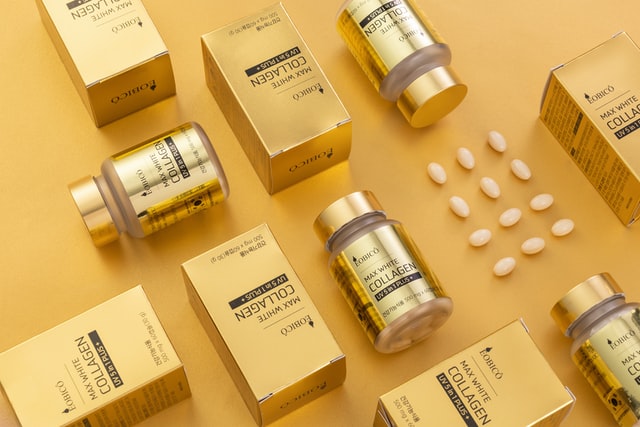A lot of famous people say that putting collagen peptides in their smoothies every day keeps them looking young and beautiful. But what, exactly, are collagen peptides? And can the rest of us get to this so-called fountain of youth?
Beth Czerwony, RD, a registered dietitian, talks about what collagen peptides are and how they can help your body.
What are the peptides in collagen?
Czerwony says that collagen peptides are a supplement that can help your body make up for the collagen it has lost. They are a small, easy-to-digest form of collagen, which is a protein that your body makes naturally.
But what’s the point of collagen?
Collagen is important for the health of your skin, bones, and connective tissues. It keeps your joints strong, makes your skin flexible, and protects your organs, among other things. Collagen is the glue that keeps your body together.
But when you’re in your 20s, your body starts to lose collagen. By the time you’re 40, you’re likely to lose about 1% of your body’s collagen every year. Menopause speeds up this loss, which can lead to wrinkles, stiff joints, worn-out cartilage, and less muscle mass.
What do collagen peptides do?
Even though we may not have Jennifer Aniston’s genes, we can still get some of the benefits of collagen peptides, which she says are great. The actress has said that she puts a scoop of protein powder in her smoothie every morning to keep her skin looking young and her body flexible.
Taking collagen peptides, which are also called hydrolyzed collagen or collagen hydrolysate, can help you avoid health problems by giving your body more collagen. Czerwony talks about what collagen supplements can do for your body, from your skin to the health of your gut.
1. Maintains skin elasticity
We all know that as we age, our skin gets less smooth and more wrinkled. But collagen peptides can help skin that is getting older. Czerwony says, “They help tighten and plump up the skin so you look a little bit younger.”
Studies show that collagen peptides may actually slow the ageing process by keeping the skin moist, which keeps wrinkles from forming.
2. Eases joint pain
You sound like you’re getting old. Your joints are flexible because of the collagen in your body. If your body stops making collagen, you are more likely to get joint problems like osteoarthritis.
“Collagen peptides can help protect your ligaments and tendons,” says Czerwony. “Anyone with arthritis or who works out a lot should give them a try.” Collagen peptides have been shown in studies to help athletes, the elderly, and people with degenerative joint disease feel less pain in their joints.
3. Makes bones and muscles stronger
Osteoarthritis isn’t the only illness that can come with age, of course. Another risk is osteoporosis, which makes bones weak.
Your bones are mostly made of collagen, so when your body stops making collagen, your bones become weaker and more likely to break. Researchers have found that taking collagen peptides may help treat and prevent osteoporosis.
Collagen makes up as much as 10% of your muscle tissue, so people with sarcopenia (loss of muscle mass) may also benefit from collagen peptides.
Different kinds of collagen and supplements for collagen
Collagen peptides are usually made from bovine (beef) or porcine (pig) sources and come in both pill and powder forms. There are also collagen supplements made from the skin or scales of fish.
At least for now, there are no collagen supplements that are vegan because collagen comes from animal bones and skin.
Taking collagen peptides comes with risks and side effects.
Good news: there are no known side effects of taking collagen peptides unless you are allergic to one of their ingredients. Check the label carefully, but if you don’t have any allergies, collagen peptides should be fine to try.
Czerwony says the worst that could happen is that they won’t work, but there’s no real risk. She says, “More research needs to be done on the overall benefits of collagen peptides, but it’s clear that in the right amounts, they won’t hurt you.” “So if you think they are helping you, go for it.”
Studies show that you can take between 2.5 and 15 grammes of collagen peptides per day without getting sick. Make sure to read the label on your collagen peptides to find out how much you’re getting per scoop, and follow the dosing instructions to add it to coffee, smoothies, and protein shakes. Usually, one to two scoops (or tablespoons) is the norm.
Collagen peptides: how to take them
“Take them however you like to get your day off on the right foot,” says Czerwony.
Collagen peptides shouldn’t get sticky or gel-like when they get wet, so they’ll dissolve in your drinks without changing the taste or texture (though flavoured versions are available). If yours sticks together, especially in cold drinks, you might want to try a different brand.
Does heat hurt collagen peptides in any way?
You may have heard that heat is bad for collagen peptides, but that’s not true unless they get really, really hot, like 572 degrees Fahrenheit (300 degrees Celsius) or higher.
So, no, you shouldn’t put your collagen peptides in a pizza oven to heat them up. But you don’t have to worry if you just put them in your hot coffee.
